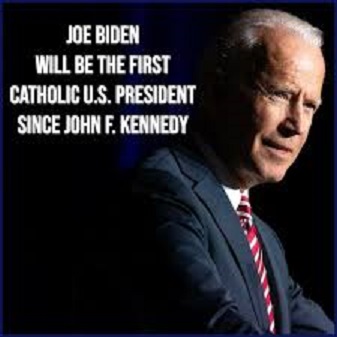Joe Biden’s Catholicism
Paul Collins | 18 January 2021
From John Menadue’s Policy Publication, Pearls and Irritation.
Joe Biden has been inaugurated as the 46th US President. He succeeds Donald Trump, with the hope on succeeds. Journalist and broadcaster, Paul Collins (with whom we share decades of MSC memories) highlights aspects of Biden’s Catholicism.
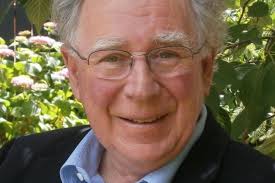
With the exception of Jimmy Carter and George W. Bush, religion has not been a big deal for recent US presidents who were, at best, nominal Christians. For Joe Biden faith is central to who he is.
The only Catholic president before Biden came from Boston Irish wealth, was a Harvard graduate and his father was US ambassador to the Court of Saint James. In contrast to John F. Kennedy, Joseph Robinette Biden was born lower middle class Irish and partly French Catholic in November 1942 in Scranton, Pennsylvania, a small city famous for anthracite mining and heavy industry. The city fell on hard times in the post-World War II period, and when Biden was thirteen the family moved to Wilmington, Delaware, after his father lost his job in Scranton.
There have been lots of successful Catholic politicians in democracies like the US and Australia. Most of them keep their faith private, but Biden is different; he’s right up-front about his Catholicism. ‘It’s foundational to who he is,’ his long-time friend, Senator Chris Coons of Delaware says.
Coons also says that Biden’s stances on social justice, race, refugee and environmental issues are informed by ‘a deeply rooted sense of fairness’ that he learned from his parents and his Catholic formation. He has profoundly assimilated the Christian sense of the importance of the community over individualism, of putting others before self, and he sees politics in the words of Pope Francis ‘as something more noble than posturing, marketing and social spin.’
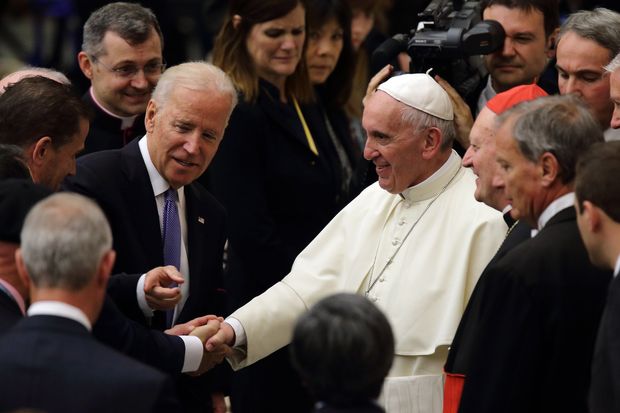
As well as the Catholic tradition of social justice, his faith is deeply rooted in the church’s spirituality and practice. He attends Mass every Sunday and quite often on weekdays. He prays regularly, often quotes the bible in political speeches and even publicly bursts into popular hymns, as he did in his November 7, 2020 victory speech when he quoted Michael Joncas’ hymn On Eagle’s Wings. ‘In the last days of the campaign,’ he said, ‘I began thinking about a hymn that means a lot to me and my family, particularly my deceased son Beau. It captures the faith that sustains me and…I hope it can provide some comfort and solace to the…Americans who have lost a loved one through this terrible virus this year.’ He then quoted the first verse:
You who dwell in the shelter of the Lord
Who abide in His shadow for life,
Say to the Lord ‘My refuge, my rock in whom I trust!’
And He will raise you up on eagles’ wings
Bear you on the breath of dawn
Make you to shine like the sun
And hold you in the palm of His hand.
It’s this kind of faith that sustained Biden through the death of his first wife Neilia and their thirteen-month-old daughter Naomi, in a car accident in December 1972 and later when his son Joseph (‘Beau’) died from cancer in 2015.
Nowadays when you say someone is a committed ‘Catholic’ in the US (and Australia), you have to be more specific. Biden is a serious post-Vatican II Catholic and it is this that has got him into trouble with conservative (mainly Republican-voting ) Catholics and the majority of the US bishops.
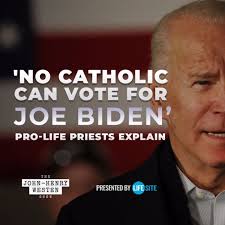
The simple fact is that the US church is deeply divided. Almost all the bishops appointed by Popes John Paul II and Benedict XVI are conservative and some of them are extreme reactionaries who are openly critical of Pope Francis. While these bishops give lip service to mainstream Catholic moral and social teaching, their focus is primarily on abortion and to a lesser extent on contraception, gay marriage and euthanasia. It also helps as a bishop if you vote Republican. In fact, until recently the US bishops’ conference resembled a local branch of the Republican Party. Pope Francis has appointed better quality bishops with broader perspectives, but the hard-liners still constitute the majority on the episcopal bench.
On abortion and contraception Catholics like Biden – and John Kerry who ran against George W. Bush in 2004 – have had a hard time from many clergy who want to deny them Communion because of their views. Fortunately, Biden’s Wilmington parish priest and the recently appointed Archbishop of Washington, Cardinal Wilton Gregory, have protected Biden from the Communion-denial brigade.
Conservatives accuse Biden of being ‘weak’ on abortion. Early on he was a supporter of the Hyde Amendment which prevented public funds being used for abortion. By 2007 he had moved to say that while he was ‘personally opposed to abortion,’ he couldn’t ‘impose [his] view on the rest of society.’ By 2020 his policy was to codify Roe V Wade by neutralizing state laws that made the right to abortion difficult. He says unequivocally ‘Reproductive rights are a constitutional right’ and ‘every woman should have that right.’ He supports the Affordable Care Act covering contraceptives and, as President, will restore funding to Planned Parenthood.
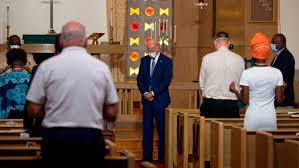
This is red rag to reactionary bishops. Rather than welcoming the fact that a practising and committed Catholic had been elected US President, the Bishops’ Conference leader, Archbishop José Gomes of Los Angeles, issued a warning that the church was facing ‘a difficult and complex situation…When politicians who profess the Catholic faith support [abortion rights], there are additional problems…It creates confusion among the faithful about what the Catholic Church actually teaches on these questions.’
Despite the bishops’ strictures, according to a 2019 Pew Research survey, 56% of U.S. Catholics said abortion should be legal in all or most cases, while 42% said it should be illegal. However, two-thirds of regular Mass going Catholics oppose abortion, while 33% said it should be legal.
The problem for Biden and other Catholic politicians is the way in which abortion has been isolated, as though it were the only touchstone for the whole of Catholic morality and belief. For a Catholic in public life like Biden, conscientious decisions on this issue are more complex than for bishops. As President, he is legally and publicly accountable to the electorate where there is clear support for the right to an abortion. Again, according to Pew, ‘currently 61% [of Americans] say abortion should be legal in all or most cases,’ while 38% say it should be illegal.
Clearly, Biden is far more ‘Catholic’ in the true sense of the word – open to others, broad, embracing rather than excluding – than many of the bishops. Mind you, that’s not hard, given the number of ideologues that inhabit the bishops’ bench.
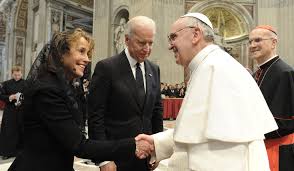
But in the end, Biden as a politician in a democracy has to be able to get things done, above all to rein-in Coronavirus and restore public integrity post-Trump. While goodness, empathy, decency, moral principles, even a deep faith, are important in a leader, in the end, Biden will be judged by his ability to deal with process, compromise, the often-nasty give and take reality of politics, while balancing the difference between religious faith and the secular state.
Given his vast experience, his clear moral compass, his inbred decency and warm humanity, we can be confident that with Joseph Biden a new era is beginning in Washington.
